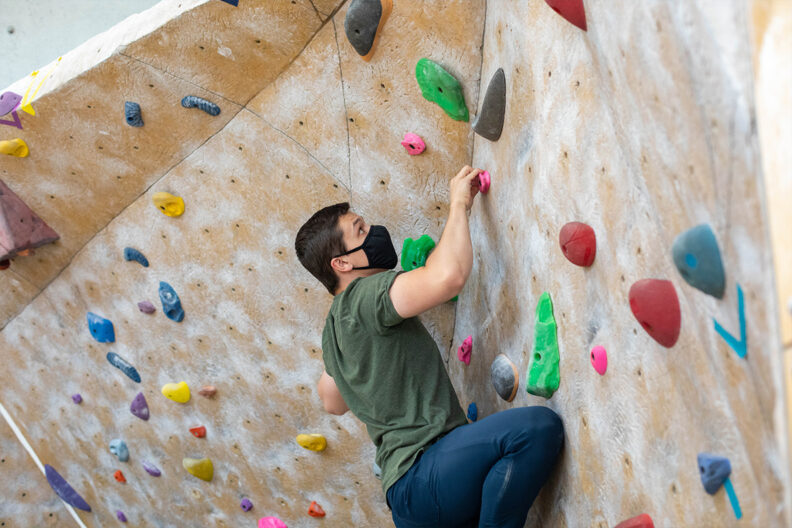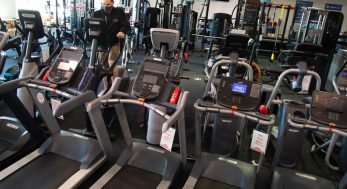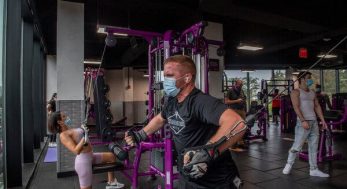
With students navigating a new college landscape filled with many different policies and procedures, University Recreation and Cougar Health Services are ready to help them manage the anxiety such change brings.
Students, faculty and staff are already utilizing the Student Recreation Center (SRC), Chinook Student Center, and Stephenson Fitness Center.
“From a stress management perspective, it is really important to have space for students to exercise and interact with others from a safe distance,” said Joanne Greene, UREC director of programs. “We provide a low-risk option for students to get out of their residence halls and apartments to be active and social.”
A better virtual experience
Greene said there are fitness options available for students both on-and-off campus. About 60% of the fitness classes are available online and accessible to Cougs across the university system.
“In preparation for fall we invested in some new cameras, microphones and lighting, that will allow us to offer a better online fitness class experience,” Greene said.
Some fitness classes require specialized equipment and work best with in-person audiences. For those classes, the number of participants will be limited to allow for physical distancing.
Intramural sports that are played in-person are limited to those that can be played outdoors such as such as softball and 5-on-5 soccer. Physical distancing is required on the sidelines and everyone needs to wear a mask for all sports. Intramural Sports also offers esports and other virtual opportunities to participate.
Even though Washington Governor Jay Inslee recently reduced social distancing guidelines for gyms located in counties in phase 3, which includes Whitman County, UREC is still adhering to 300 square feet per person due to the current local spike in coronavirus cases. This guideline does not apply while practicing certain team sports. Greene said a maximum of about 200 people will be allowed in the SRC, and 130 in the Chinook, at any given time. During normal times, up to 600 people pass through the SRC turnstiles every hour during peak times.
Reserve space early
To help monitor the number of people in each exercise space, everyone is required to reserve a spot to utilize everything from the weight rooms and pool, to the climbing wall, track, and basketball courts. Reservations for the SRC can be made on the UREC website, while students can visit the Chinook Student Center website to make reservations there.
Greene said the changes will take a little time to get used to, but so far students have responded very well. Masks are required to be worn in all facilities, except for a couple of areas in the SRC where social distancing can be guaranteed.
“We were nervous about requiring them to wear face masks which has been an issue in other gyms, but they have been really understanding,” Greene said. “Most have been bringing their own masks and we’ve had to ask very few to put them on.”
The Governor’s guidelines restrict the operation of the hot tub or saunas. Showers and towel service have also been suspended.
The fitness centers on the WSU Tri-Cities and Vancouver campuses are closed and offering a variety of online classes. Students on the Tri-Cities campus can participate in live yoga sessions, a step challenge, receive running tips, and learn desk exercises. Tri-Cities campus Recreation and Fitness Coordinator RJ Aubert said all the esports offerings, including FIFA20 and Super Smash Bros., have been popular.
WSU Vancouver has also been creative with its fitness offerings promoting online activities such as a weekly fitness challenge, a 5K race, a stress support seminar, and a Michael Jackson thriller dance fitness class.
“We are really excited about these offerings and are working endlessly to help satisfy our patrons,” said Wellness Intern and Fitness Center Manager Johnny Pham.
Finding a new normal
While exercising is an excellent way to manage the stresses of school and the pandemic, many students also benefit from professional counseling services.
Jennifer Ellsworth, director of Counseling and Psychological Services (CAPS), said some students, who are trying to find a new normal amidst all the changes taking place in the world, find the situation overwhelming.
“The typical stressors college students face can already be overwhelming at times,” Ellsworth said. “Dealing with the pandemic brings many more concerns, whether it’s being worried about getting sick or having family members in the high-risk category, their family’s financial livelihoods, and all the racial violence and political divide we are experiencing now.”
Ellsworth wants students to know that no matter where they are living, CAPS is ready to help. Students need to call the main office line to make a virtual appointment. Students working with a psychiatric professional or require ADHD testing may be asked to visit the clinic for further evaluation. Virtual crisis appointments are also available which allows students to visit with a counselor the same day they call.
Virtual advantages
While one might assume that receiving counseling via Zoom is awkward, Ellsworth points out the sessions are private, secure, and as effective as in-person appointments. They are a little different from in-person appointments, but she said students get used to them quickly.
“What we are hearing from students, as well as other universities nationally, is that virtual sessions are more accessible and convenient,” Ellsworth said. “You can do it from the privacy of your bedroom and it’s as easy as using the Zoom app on your cellphone.”
Ellsworth has recently welcomed several new staff members to her team and is excited her team is currently at full-strength for fall semester. She asked everyone to complete six-hours of continuing education on how to engage students effectively in virtual counseling.
During normal times, CAPS staff seeks out opportunities to visit with student groups, learn about what issues students are facing, and make them aware of their services. Even though they are not able to meet with students in-person right now, they are providing group counseling via Zoom and will offer some outreach programs addressing various topics starting in October.
“We know mental health needs will increase with the pandemic and everything else that is happening in their lives, and we are eager to reach out to them,” Ellsworth said. “Our hearts are with students and we are doing everything possible to make resources available to them.”
Students on the WSU Tri-Cities, Spokane, Vancouver and Everett campuses also have access to telecounseling. WSU Vancouver is offering two weekly group drop-in sessions, “Let’s Talk VanCougs” and “Live Better, Stress Less.” Anna McLeod, associate director of Student Affairs at WSU Everett, said she and her colleagues are encouraging students to use the Stress Management Texting Resource offered by Cougar Health Services that allows them to receive regular check-ins and tips for lowering stress on their phones. Students on all campuses can sign-up for this resource at anytime by texting “@STRESS” to 73940.

